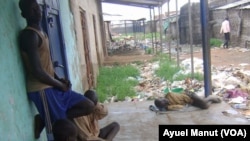Teenager Garang Riing Deng has been living in the streets in Warrap state capital Kuacjok for years now, eking out a meager living.
"I used to polish shoes and then I began to collect empty plastic containers, and, later, I moved into the market," the 15-year-old told South Sudan in Focus.
"I don’t rob or steal. I only collect empty containers and charcoal and sell them and eat from that money,” he said.
But traders say the children are a menace and are calling on the state and national government to get them off the streets and out of their hair.
Kiizito Musa, a Ugandan trader in Kuacjok market, says traders would probably contribute to a government initiative that puts a roof over the heads of the children.
“Even if they come and they say they are collecting money -- even five pounds or 10 pounds -- for those boys, I think the people can pay the money because the children are disturbing them a lot. They are tired of them,” Musa said.
Sudanese businessman Yahya Yusif Abdala said the children harass him every day.
"They are affecting our work," he said.
"When your things are displayed in the shops, they come and pick your goods and run away and when you chase after them, they fight you by throwing stones at you until you call the police to arrest them," he said.
Malook Cinkoc Thony, the director of child welfare in Warrap state’s Social Development Ministry, said a 2012 assessment conducted in three counties -- Gogrial West, Twic and Tonj South -- found there were 360 children living in the streets.
Most of the children were aged between five and 17 years and were not orphans but had chosen to live in the streets because there was not enough food to go around at home.
Residents said the number of homeless children has grown since South Sudan plunged into crisis in December, but they were unable to say if the fighting was the cause.
According to Thony, the state government does not have the funds to build a home for the children. He appealed to local and international NGOs to step in and help.




